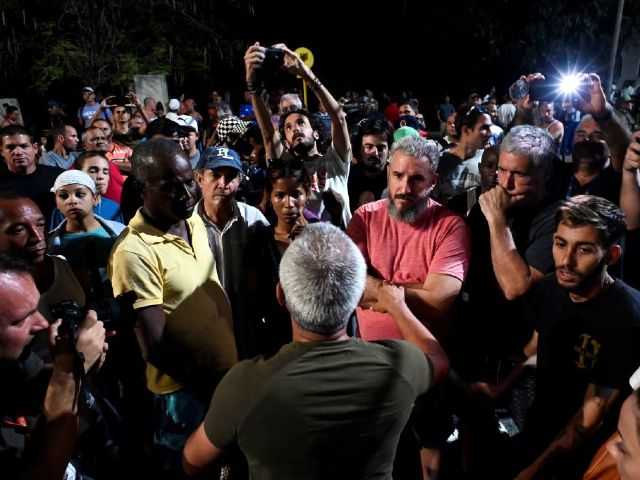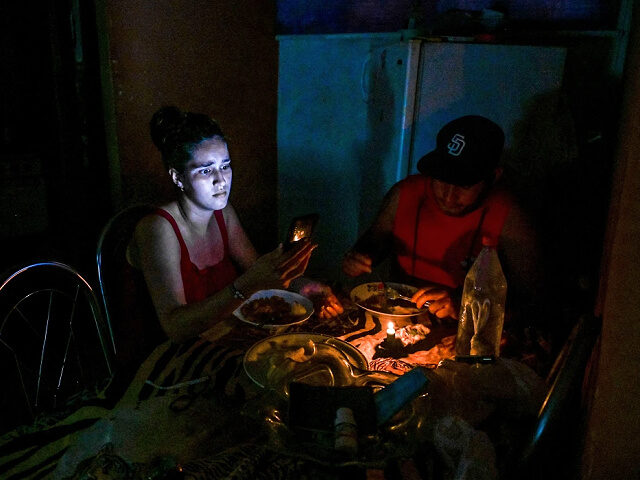The communist Castro regime in Cuba aired a new set of propaganda pieces through its media apparatus this week claiming Cuban citizens are “content” with daily power blackouts and offering tips to make the most out of the three hours of electricity that they receive per day.
Cuba’s obsolete power grid infrastructure — some of which still features Soviet-era equipment — has further teetered on the brink of total collapse throughout 2022, which prompted the communist regime to impose fierce rolling blackout schedules across all of Cuba’s cities. Citizens have responded by fiercely and peacefully protesting against the Castro regime on a daily basis, demanding not just an end to the blackouts, but an end to the communist regime that has ruled over them for more than six decades.
The already derelict state of Cuba’s power grid and severe deficit in power generation took another hit following the passage of Hurricane Ian in September, which prompted Cuban citizens to continue protesting in peace despite the ever-growing repression of the communist regime.
As reported by the Spain-based website Diario De Cuba on Friday and the outlet Cibercuba on Thursday, the regime aired interviews of Cuban women on Tuesday through its television channel, Canal Caribe. In the interviews, Cuban women offered tips to make the most out of the roughly three hours of power that Cuban citizens are receiving per day as part of the regime’s electrical authority to share the power blackouts in an “equitable way.”
“In the three hours [of power] we try to carry out the tasks that we have pending. That is to say, if we are going to clean we have to know that, at the moment they put it [power] on us, we have to have everything ready,” said Ridalma Ríos Camino, a Cuban citizen from the province of Ciego de Ávila during the regime’s Canal Caribe Tuesday evening news.
“The family must cooperate so that everything is done in the estimated time,” Cuban citizen Isabel María Empernas said, while exclaiming that, “in union everything can be achieved.”

A government official speaks with people as they protest the lack of power in the aftermath Hurricane Ian in Havana, on September 1, 2022. (Photo by YAMIL LAGE/AFP via Getty Images)
“The three-hour experience does not solve the blackout, but it does help ensure that energy reaches all consumers in an equitable way, while keeping them away from long cycles,” the regime’s news anchor stated.
The interviews, which omitted any dissenting voice or criticism of the communist regime’s handling of the power grid situation, are part of the “Creative Resistance” narrative spearheaded by the Castro regime puppet-president Miguel Díaz-Canel since January that seeks to exempt the Castro regime from responsibility for any of the island’s severe woes, placing all of the blame on United States’ sanctions and the “embargo” of Cuba.
The Castro regime’s continuous narrative against the “embargo” was once again bolstered through a pro-communist hashtag, #MejorSinBloqueo (“better without the blockade”), promoted on Thursday and Friday following the U.N. General Assembly’s routine vote to condemn the United States for its “embargo” of Cuba. Only the United States and Israel voted against the condemnation; Brazil and Ukraine abstained. Castro regime officials have cataloged the results of the U.N. vote as a “victory for truth and justice.”
The worsening inhumane conditions that Cuban citizens continue to face — such as the power blackouts, lack of access to medicine and proper health care, hunger, and the regime’s brutal repression — have caused an upsurge in the number of Cubans desperately fleeing from communism throughout 2022.
The Biden administration continues to detain and deport Cuban balseros, or “rafters,” Cuban exiles that make the dangerous sea trip to flee from Cuba towards the United States via boats or makeshift rafts.
In addition to the Biden administration’s mass deportation of rafters and their ongoing discouragement of the practice, rafters must also face the dangers of the Castro regime that will do anything in their power to stop them from fleeing Cuba, going as far as to ram a boat with the intent of sinking it, killing four adults and a two-year-old baby on October 29.
Their only other option is to pay exorbitant fees to Mexican drug cartel smugglers, known as coyotes, to make the trip by land, leaving them highly exposed to human trafficking and, in some cases, forced into sexual slavery to pay the smuggling fees that are often unpayable by Cuban citizens fleeing from the communist regime.
Christian K. Caruzo is a Venezuelan writer and documents life under socialism. You can follow him on Twitter here.

COMMENTS
Please let us know if you're having issues with commenting.